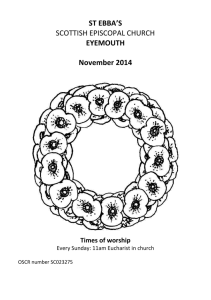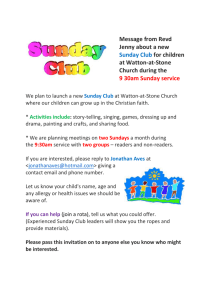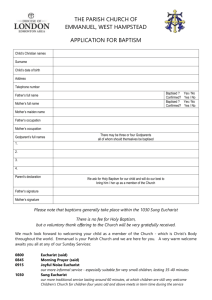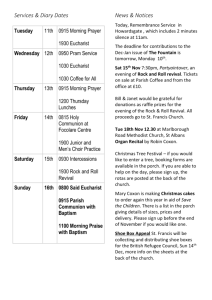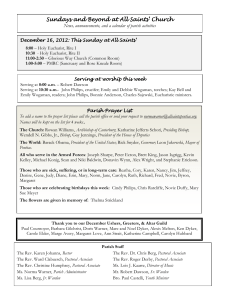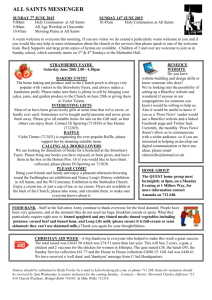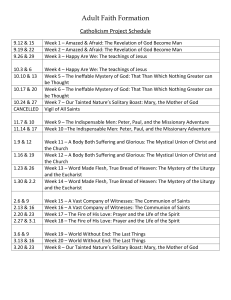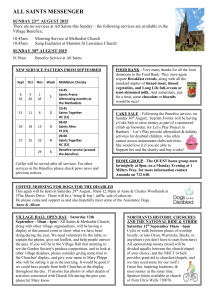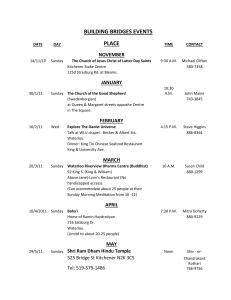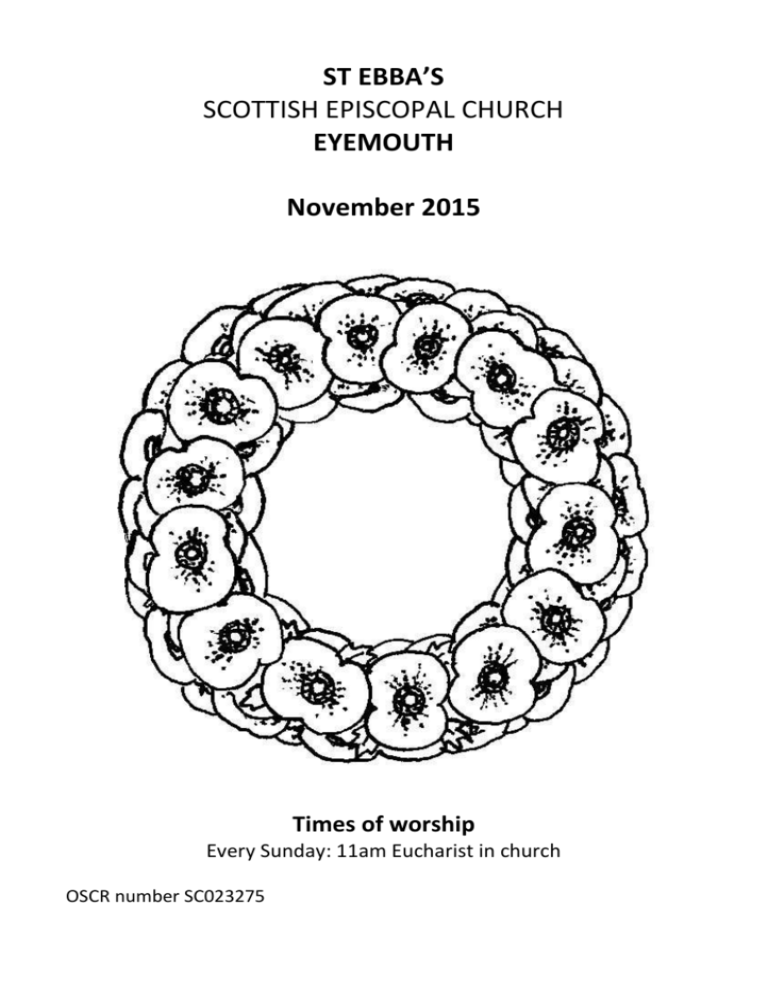
ST EBBA’S
SCOTTISH EPISCOPAL CHURCH
EYEMOUTH
November 2015
Times of worship
Every Sunday: 11am Eucharist in church
OSCR number SC023275
Priest’s Ponderings
With our AGM looming on 29th November, I have been thinking long
and hard about where we are and where we might go. It’s a while since I heard
anyone mention Local Collaborative Ministry so I’d like to remind you of our
present status.
If you go back and meditate on St Paul’s epistles, you may notice that
all the places he wrote to give us glimpses of groups of people who had come
to belief in Jesus and were creating their own churches in small,
compassionate, cantankerous, hospitable and believably human
congregations. The evidence is thin but the pictures painted by Paul’s letters
are of congregations inventing their own structures as they go along according
to what fits their local needs. Although the congregations were small, they
were totally committed to exploring the ways in which they could support each
other and spread the word of God as they had discovered it in Jesus.
We have a long history of church life in this country but it is crumbling
around us. I find it fascinating to observe the differences between a novel
called ‘Jane and Prudence’ by Barbara Pym written in the 1960s and another
novel written in the 1990s by Susan Howatch called ‘A question of integrity’.
Both are about Christianity and the church but the earlier one assumes
commonly understood belief while the later one has characters who are
struggling in a world where belief is an anachronism. We have witnessed the
breakdown of belief systems and allegiances. Priests are in short supply and
the historic bases of church finance are crumbling away so that local churches
must find their own solutions if they are to continue to exist.
This is what we started at St Ebba’s in 2009. We looked at possibilities
and agreed to set out on the road to collaborative ministry. Looking back at
that decision, I am not sure we had really understood what that means. When
I look at Paul’s description of the young churches he visited, he paints a picture
of groups of people wholly committed to the life of their church. Those
churches recognised each individual’s gifts as given to them by God and each
member exercised their gift within the family of their church so that they
supported each other and grew together in faith and love. Each member has
to play their part in that growth and accept responsibility for their church’s life
and work. No-one is likely to shoulder
that sort of responsibility unless they are truly committed.
It is clear that in all of the churches Paul wrote to, leadership is
corporate. They are loving families who share the responsibilities of day-today living and growing. I was caught by a quotation in a book I was reading
(though I have no idea who said it originally): “A boat is safest when it is at
anchor in a sheltered harbour. But that is not what a boat is for.” Jesus never
looked for safety and if we are to be his followers, we may have to take risks
in order to grow in fellowship and faith. We may have to rock the boat a bit
but then we can move out together into new life, trusting in the guidance of
the Holy Spirit. Through the strength of praying and sharing together, we will
be able to take forward the messages of love and support that God invites us
to share with all those around us.
I hope and pray that you will be able to come along to the AGM to hear
about what we might be able to do if you are willing to give us your active
support.
Jennifer
EAST BERWICKSHIRE CHURCHES TOGETHER - Dates for your Diary
Sunday 8th November Remembrance Sunday Service with Royal British
Legion 2.30 p.m. Parish Church
Sunday 29th November 5 p.m. Switch-on of Christmas lights by
Eyemouth Herring Queen
Sunday 20th December 6.30 p.m. - Carols by Candlelight - Coldingham
Priory
BIBLE 4 2-day (2nd & 4th Monday evenings) Parish Church Hall
'Getting to Grips with the Bible'. Tea/coffee available from 7.15 p.m.
7.45 Short, simple worship followed by talk with group discussion. Close
with short act of worship finishing 9 p.m. prompt. Come along and bring
questions and an open mind
Wednesday Advent Study Group beginning 2nd December - St Ebba's
Parsonage, Beach Ave
10 a.m. Communion; 10.30 Tea/Coffee; 11 a.m. Discussion of York
Course Advent material. Finish 12 noon. Arrive at 10, 10.30 or 11 a.m.
Prayer Breakfast - 1st Saturday of every month 8.30 a.m. Parish Church
Hall
Joint Service - 2nd Sunday of every month 6.30 p.m. venues by rotation
NOVEMBER DIARY
Sun 1st
Readings
Wed 4th
Readings
Sun 8th
Readings
Sun 15th
Readings
Sun 22nd
ALL SAINTS & ALL SOULS
11am Eucharist
Isaiah 25 vs 6-9
Revelation 21 vs 1-6a
John 11 vs 32-44
10.00am Eucharist
In the Parsonage
Romans 13 vs 8-10
Luke 14 vs 25-33
PENTECOST 24
11am Eucharist
1 Kings 17 vs 8-16
Hebrews 9 vs 24-28
Mark 12 vs 38-44
PENTECOST 25
11am Eucharist
Daniel 12 vs 1-3
Hebrews 10 vs 11-14, 19-25
Mark 13 vs 1-8
Readings
CHRIST THE KING
11am Eucharist
Daniel 7 vs 9-10, 13-14
Revelation 1 vs 4b-8
John 18 vs 33-37
Sun 29th
ADVENT 1
AGM
Readings
Jeremiah 33 vs 14-16
1 Thessalonians 3 vs 9-13
Luke 21 vs 25-36
INTERCESSORS AND READERS – NOVEMBER
Server
Sun 1st
Sun 8
th
Sun 15th
Sun 22
rd
Sun 29th
Intercessor
Reader
Richard Oldale
Ernie Cox
Debbie Higson
Joan Shelmerdine
Simon Furness
Frankie Taylor
Richard Oldale
Joan Thomas
Brian Payne
Joan Shelmerdine
Jan Simpson
Pat Elliott
Richard Oldale
Jennifer Edie
Susan Struthers
DON’T FORGET
The Annual General Meeting (AGM) of St Ebba's will be
held on Sunday, 29th November 2015.
This is an important part of our life as a church
community so we hope as many people as possible will
make the effort to attend. There will be a shortened
Eucharist at 11 a.m. (no sermon) and we move directly
into the A.G.M. as a part of our life and service for God.
We need
NEW MEMBERS FOR THE VESTRY
Please think about this. Volunteer yourself or ask other
members if you may nominate them. This is your
church and you have a contribution to make to our
future so please come to the meeting and take part in
discussions about future plans. If you have been in
church lately, you will see that our numbers are getting
smaller. Can you help us with suggestions of how we
might make changes if you think they are necessary?
Come and tell us what you would like to see happening
in St. Ebba’s.
5
Faith in Action for November
The most common form of violence against women in Scotland
is Domestic Abuse. This is more than just physical violence: it can
be sexual, mental or emotional, and is based on exploiting unequal
power relationships. The vast majority of domestic abuse is
carried out by men against women, though it can occur in any
intimate relationship.
It is much more common than most of us imagine - in a typical
year in Britain, I in 5 women experience domestic violence, and
every week two women are killed by their current or former
partner. We cannot and must not ignore the facts: SEC
congregations will contain both victims and abusers - domestic
abuse affects us all.
You may wish to try the following:
pray for the victims of domestic violence and the
perpetrators
include prayers for perpetrators and victims of violence, and
for agencies that assist abused women in services
preach/invite a guest preacher on this topic
observe the 16 Days international campaign raising
awareness of domestic violence: 25 Nov - 10 Dec
A WAR MEMORIAL IN IRELAND
I spent much of my childhood in the small market town of
Portlaoise (formerly Maryborough) in the South Midlands of Eire
50 miles SW of Dublin. It was the county town of Laois (formerly
Leix or Queen’s County). At that time it was little
bigger than Eyemouth is today. There was a lot
of poverty in the Ireland of the 1940s and 50s and
Co. Laois had its fair share of it. The memory of
the Potato Famine of the 1840s was still vivid in
the minds of many and the effects of World War
I were still evident when I was young as
evidenced by a number of people suffering from
shell-shock.
Before 1914 The Irish National Party had a lot of support
from the people as it was aiming for Home Rule. That policy was
postponed because of the outbreak of World War I. The Allied
cause was popular in Ireland because Catholic Belgium had been
invaded by the Germans. Over 100,000 Irishmen volunteered for
the front including Major Willie Redmond, the brother of John
Redmond, leader of the Irish National Party. Willie lost his life in
the conflict in 1917. Almost 50,00 Irishmen died in the Great War,
including several hundred from Portlaoise. A war memorial was
erected in the town with the a verse from Ezekiel’s Vision of the
Dry Bones inscribed below the names of the fallen:
“Come from the four winds, O Breath and breathe on these
slain, that they may live.”
Many of those named were from the 4th Battalion
(Queen’s County) of the Leinster Regiment. That battalion lost a
total of 177 soldiers along with Lt Col T. Stannus and 15 other
officers including 11 Second Lieutenants, eight Sergeants, 14
Corporals and 139 men. The majority of the casualties were very
young. Judging by the names, most of the officers were Church of
Ireland and the NCOs and men were mainly Roman Catholic.
John Redmond died in London in March 1918, and the
moderate Irish National Party was almost wiped out in the General
Election held in December 1918. Sinn Fein had gained many seats
at the expense of the National Party. The mood of the people had
changed to more extreme nationalism after the execution of the
leaders of the Easter Rebellion in 1916. The Irish War of
Independence broke out after the formation of the Irish
Provisional Government – the first Dail Eireann in January 1919.
The soldiers returning from the front came back to a changed
country.
The official opening of the Portlaoise War Memorial took
place on the overcast day of Thursday 15th November 1928. More
than 500 people attended that ceremony, including around 200
ex-soldiers. Due to extensive redevelopment, the Portlaoise War
Memorial was moved to a small park at Mill View in 2001. After
decades of non-recognition by the Irish government and local
authorities, ecumenical memorial services take place regularly on
Armistice Day in Portlaoise and in many other parts of the Irish
Republic.
Portlaoise has moved on. It had a population of 3,800 in
1961, now it has over 20,000 (2011) – owing much of its prosperity
to good road and rail links to other parts of Ireland.
Ernie Cox
Time for Remembrance
If you would like to pay your own personal tribute to
the soldiers who died during the First World War, then why
not consider participating in a very easy project being run by
the British Legion? Not only is it commemorative, but it is one
which will yield big results for your garden next year!
It is the Centenary Poppy Campaign, in which the
Royal British Legion has joined forces with B&Q to encourage
the public and local authorities to plant Flanders poppy seeds
on their own land. The Flanders poppy seeds can be
purchased from B&Q, where a donation of £1 will go towards
the work of the Legion. Just visit your B&Q for more details.
ST EBBA's WAS FULL!
Well if you weren't in Church on Sunday 11th October you
missed something special. Not only was it Harvest Festival
but it was the Baptism of baby Eva Ruth and wow did she
have a big party! St Ebba's was full and members of the
congregation had to double up in the pews to make space
and share books which was great. They even sat in the
choir stalls. Lovely to have a large body of people singing
(especially male voices) and the Christening party also
joined in the responses well which so often visitors
unfamiliar with our service don't.
So thank you to Simon and Patricia for the bulk of the
church decorating which looked lovely and to the family's
photographer who got stuck in and dusted our window
sills(!) and Sheila also did a bit. Well done Sheila on coping
with such a busy service and the complication of two
different versions of the Baptism booklet!
Here's to more Baptisms!
Frankie Taylor
All Saints’ Day – the feast day of all the redeemed
All Saints, or All Hallows, is the feast of all the redeemed,
known and unknown, who are now in heaven. When the English
Reformation took place, the number of saints in the calendar was
drastically reduced, with the result that All Saints’ Day stood out
with a prominence that it had never had before.
This feast day first began in the East, perhaps as early as the
5th century, as commemorating ‘the martyrs of the whole
world’. A Northern English 9th century calendar named All
Hallows as a principal feast, and such it has remained. Down the
centuries devotional writers have seen in it the fulfilment of
Pentecost and indeed of Christ’s redemptive sacrifice and
resurrection.
The saints do not belong to any religious tradition, and their
lives and witness to Christ can be appreciated by all Christians.
Richard Baxter, writing in the 17th century, wrote the following:
He wants not friends that hath thy love,
And made converse and walk with thee,
And with thy saints here and above,
With whom for ever I must be...
As for my friends, they are not lost;
The several vessels of thy fleet,
Though parted now, by tempests tost,
Shall safely in thy haven meet....
The heavenly hosts, world without end,
Shall be my company above;
And thou, my best and surest Friend,
Who shall divide me from thy love?*
*(Maurice Frost (ed.), Historical Companion to Hymns Ancient and
Modern (London: Clowes, 1962), no. 274, verses 1,3,6.
All Souls’ Day – a time of reckoning with the past
The early Church was slow to dedicate a liturgical day to
offering prayers and masses to commemorate the faithful
departed. But in time prayers were offered on behalf of dead
monks, that they might attain ‘the Beatific Vision’ through
purification, which the Church later described as Purgatory.
Odilo, the powerful abbot of Cluny, (d 1049) decreed that
All Souls’ Day should follow the feast of All Saints’ Day.
In bygone centuries All Souls’ Day was certainly
uncomfortable for anyone who had wronged a person who
had then died. For it was believed that souls in purgatory
could appear on earth on this day, in the form of ghosts,
witches or toads, to haunt anyone who had wronged them in
life.
On a more cheerful note, it was also believed that you
could help the dead on this day by almsgiving in cash or in
kind. Some of these beliefs seem to have been caught up in
the popular customs of Hallowe’en.
When the Reformation came, the Protestants disregarded
the idea of Purgatory, and this feast day remained with the
Roman Catholic Church.
TALK ABOUT AUSTERY
David Winter remembers the end of the Second World War…
This year we have marked the 70th anniversary of VE Day and
VJ Day, memorable days of celebration as the Second World War
came to an end. What some of us are now remembering,
however, is what followed. It was certainly no instant transfer
from the arduous years of war to the joys of peace. Indeed, for
many ordinary people in Britain the immediate post-war years
were times of acute struggle. It was lovely to welcome back the
men and women who had served in the Forces, but – speaking as
a teenager at the time – the fruits of victory were hard to identify
(though we did get our first bananas!).
Our cities were pockmarked with ugly bomb-sites. There was
still rationing of food, clothes and ‘luxuries’. Sir Stafford Cripps,
Chancellor of the Exchequer, could promise no immediate relief
– he was dubbed ‘Austerity Cripps’. Fuel was often in short
supply, and we had a couple of very cold winters. If this was what
it was like to be the winners, how must it have been for the
losers? We learnt later the answer: no worse, and in some cases
a bit better!
When politicians speak now of ‘austerity’, we children of the
post-war age are tempted to reply: ‘You don’t know what
austerity is’.
HEALTH TIPS
WAIST HIGH
How does your waist measure against your height?
If you want a quick way of determining whether you should
lose weight or not, simply measure your waist, and compare it
with your height. The secret to a long life is having your waistline
no larger than half of your height.
A recent study by Cass Business School at City University,
London, based on two decades of medical research, said that a
waist to height ratio of 80 per cent or more could reduce your
life expectancy by up to 20 years.
MIND YOUR BACK
Lots of everyday activities can take a toll on your back, even if
you don’t notice it at the time. Here are a few tips that will help
you to avoid back problems:
Firstly, while standing to perform ordinary tasks like ironing or
folding laundry, keep one foot on a small step-stool. Then, when
bending from the waist, always use your hands to support
yourself.
Don’t sit or stand in the same position for too long. Stretch,
shift your position and walk about a bit when you can. When
sitting, keep your knees a bit higher than your hips and bend
them at a 90-degree angle. Your feet should be comfortably on
the floor (if they don’t reach the floor, put a book or a small stool
under them).
Finally, remember that even using a vacuum cleaner can take a
toll on your back. So tackle a large room in chunks, spending no
more than five or ten minutes at a time on this task. Simple tips
like these will pay dividends.
LAUGHTER LINES
Preacher: Can everyone hear me at the back?
Voice from the back: Yes, but I wouldn’t mind changing seats
with someone who can’t!
A Sunday school teacher asked her children: “And why is it
necessary to be quiet in church?”
One little girl replied helpfully: “Because people are sleeping.”
He’s an original preacher, our new curate. He makes a lot of
mistakes, and they are different every time.
The vicar was preaching a powerful sermon concerning death
and judgment. In the course of the sermon, he said: “Just think
– all of you living in this parish will one day die.” At this, a man in
the front pew began to laugh quietly.
After the service the vicar demanded sternly why he had
found such a serious subject so funny? The man explained: “I
was just happy, because I don’t live in this parish.”
The new minister was visiting in the homes of his parishioners.
At one house it seemed obvious that someone was at home, but
no answer came to his repeated knocks at the door. Finally he
took out a card, wrote "Behold, I stand at the door and knock."
Revelation 3:20’ on the back and stuck it in the door.
When the offering was processed the following Sunday, he
found that his card had been returned. Added to it was this
cryptic message, ‘Genesis 3:10’.
Reaching for his Bible, he read: "I heard your voice in the
garden and I was afraid for I was naked." Genesis 3:10’
CHURCH CONTACTS
Priests
the Revd Sheila Cox
the Revd Jennifer Edie
the Revd David Smout
the Revd Tim Morris
Lay Rep
Brian Payne
Alt Lay Rep
David Garside
People’s Warden Richard Oldale
Administrator Jennifer Edie
Treasurer
David Garside
01890 771764
01890 750169
01890 771220
01289 386615
018907 81825
01890 751159
01890 750939
01890 750169
01890 751159
St Ebba’s Church, Fort View, Paxton Terrace, Eyemouth, TD14 5EL
St Ebba’s Parsonage, Beach Avenue, Eyemouth, TD14 5EL
www.stebbas.org.uk
If you are in hospital and would like us to know and/or to visit, under
the current regulations you have to specifically ask the hospital to
inform us.
If you want to keep up with what’s happening here and
across the Borders, you will find the minutes of our own
Vestry meetings and the Borders Area Council meeting
in the files at the back of the church.
EDITOR’S NOTE:
Thanks to everyone who has contributed pieces to this month’s
newsletter.
The next newsletter is a double issue to cover Dec and Jan so please
send all contributions and comments to me at
thebordersdesignhouse@hotmail.com (tel 01890 761271) by 15
November at the latest.
Thank you.
Pat
© 2015 Parish Pump Ltd, all rights reserved

